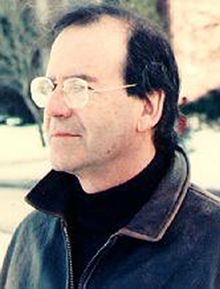Michael Shapiro
Michael Joseph Shapiro (* 1940 ) is an American political scientist. He has taught political science at the University of Hawaiʻi at Mānoa since 2008 .
life and work
From 1968 to 1970 Shapiro taught at the University of California , from 1979 to 1986 at the University of Massachusetts , from 1972 to 1973 at the University of Bergen in Norway and in 2002 at the Tisch School of the Arts at New York University .
Shapiro's early work encompassed the traditional areas of political science, including political psychology and decision theory . Around 1980, Shapiro began to explore concepts from continental philosophy and cultural studies , including governmentality , micropolitics , and rhythm analysis, and introduced unconventional methods, such as the first-person narrator , into his essays.
His work is called postdisciplinary because it brings together such disciplines as critical theory , cultural studies , film theory , literary theory , African American studies , comparative politics , geography , sociology , urban planning , economics , psychoanalysis , genre studies, musicology , aesthetics and 'indigenous politics' and united.
Fonts
- Ethical and Political Theory. General Learning Press, 1976.
- Language and Political Understanding. The Politics of Discursive Practices. Yale University Press, 1981.
- Language and Politics. New York University Press, 1984.
- The Politics of Representation. Writing Practices in Biography, Photography, and Political Analysis. University of Wisconsin Press, 1988.
- International / Intertextual Relations. Postmodern Readings of World Politics. Lexington Books, 1989.
- with Bjorn H. Jernudd : The Politics of Language Purism. Mouton De Gruyter, 1989.
- Reading the Postmodern Polity. Political Theory as Textual Practice. University of Minnesota Press, 1991.
- with Hayward R. Alker : Challenging Boundaries. Global flows, territorial identities. University of Minnesota Press, 1995.
- Violent Cartographies. Mapping Cultures of War. University of Minnesota Press, 1997.
- with David Campbell: Moral Spaces. Rethinking Ethics and World Politics. 1999.
- Cinematic Political Thought. Narrating Race, Nation and Gender. Edinburgh University Press, 1999.
- Reading 'Adam Smith'. Desire, History and Value. Rowman & Littlefield, 2002.
- For moral ambiguity. National Culture and the Politics of the Family. University of Minnesota Press, 2001.
- with Jane Bennet: The Politics of Moralizing. Routledge, 2002.
- Methods and Nations. Cultural Governance and the Indigenous Subject. Routledge, 2003.
- with Jenny Edkins, Veronique Pin-Fat: Sovereign Lives. Power in Global Politics. Routledge 2004.
- Deforming American Political Thought. Ethnicity, Facticity, and Genre. The University Press of Kentucky, 2006.
- Cinematic Geopolitics. Routledge, 2008.
- The Time of the City. Politics, philosophy and genre. (Routledge) 2010.
Individual evidence
- ^ A b Michael Joseph Shapiro Faculty page at the University of Hawaiʻi at Mānoa. Brief biography and bibliography. ( English ) University of Hawaiʻi at Mānoa . Archived from the original on February 19, 2011. Info: The archive link was inserted automatically and has not yet been checked. Please check the original and archive link according to the instructions and then remove this notice. Retrieved December 25, 2010.
Web links
- Michael Joseph Shapiro website at the University of Hawaiʻi at Mānoa with short biography and bibliography as well as curriculum vitae (English)
| personal data | |
|---|---|
| SURNAME | Shapiro, Michael |
| ALTERNATIVE NAMES | Shapiro, Michael Joseph (full name) |
| BRIEF DESCRIPTION | American philosopher and political scientist |
| DATE OF BIRTH | 1940 |
